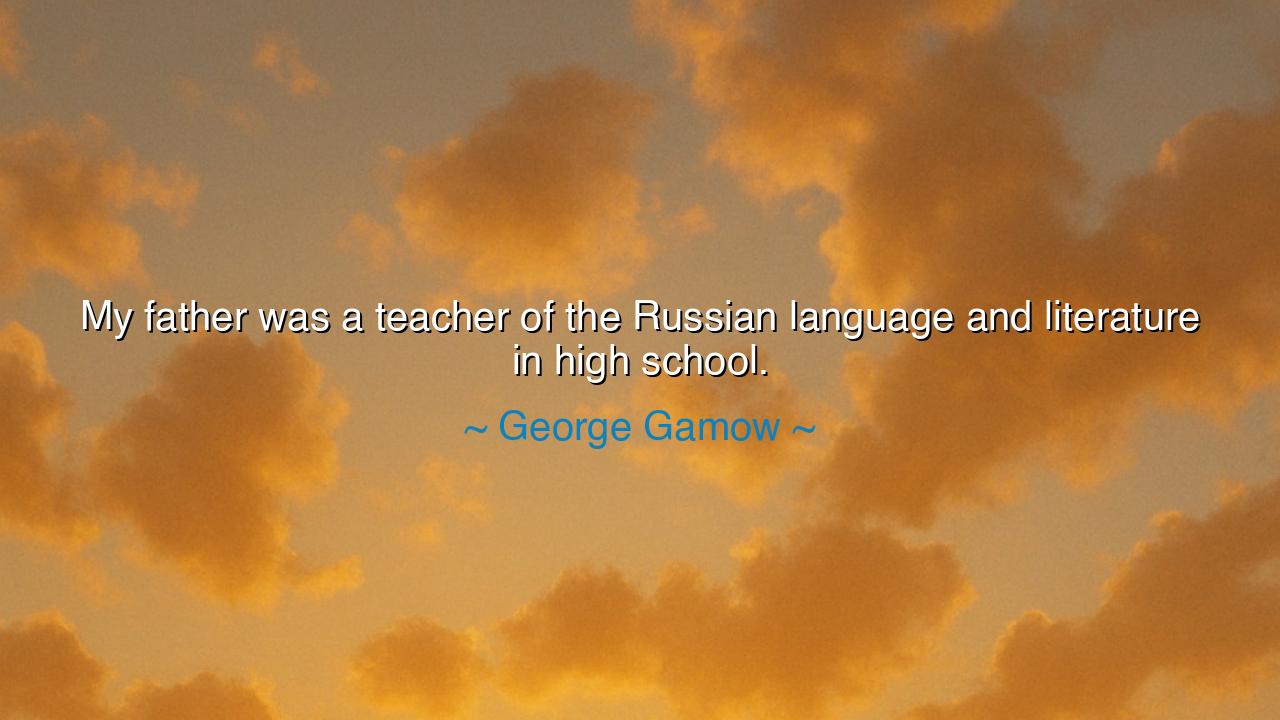
My father was a teacher of the Russian language and literature






George Gamow, the great physicist and storyteller of the cosmos, once spoke simply of his origins: “My father was a teacher of the Russian language and literature in high school.” To the unthinking ear, this may sound like a mere fact, a detail of biography. Yet to the attentive, it resounds with deeper meaning. For in these words lies the seed of Gamow’s genius — the recognition that behind every mind that soars to the stars stands a root sunk deep in the soil of language, in the living river of words and stories. His father did not teach mathematics nor physics, but he gave his son the instrument without which all thought collapses: the gift of literature, the mastery of expression, the love of meaning.
The origin of this declaration reaches back to the fertile soil of Russia, where words have always borne weight like iron and yet soared like song. To be raised by a teacher of language is to be trained in precision and beauty, in the art of shaping thought with clarity. For the poet and the scientist, though they walk different paths, both dwell in the realm of symbols. One weaves images; the other equations. But the heart of both is the same: to speak truth, whether through verse or through formula. Thus, when Gamow traced the birth of the universe in his theory of the Big Bang, it was also an act of storytelling, the continuation of the heritage he had received from his father’s classroom.
We see this pattern throughout history. Consider Galileo, who is remembered as a mathematician and astronomer. Yet his power to move the world did not rest only in his discoveries, but in his words. His Dialogue Concerning the Two Chief World Systems was written not as a dry proof but as a living conversation, a literary act of persuasion. Like Gamow, Galileo stood on the foundation of language, and from that foundation built the tower of science. The wisdom of his father’s trade echoes here: the world belongs not to those who know, but to those who can teach, and to teach is to breathe life into words.
The story of Gamow himself reflects this. He was not only a scientist who advanced quantum theory and cosmology, but also an author who explained the mysteries of physics through charming tales — books filled with imagination, humor, and clarity. His Mr. Tompkins series clothed the deep truths of relativity and quantum mechanics in parables and dreamscapes that any curious soul could grasp. Can we not see the hand of his father the teacher, whose daily labor was to turn words into light for young minds? That gift, passed from father to son, became a bridge between the stars and the common man.
The lesson is clear: knowledge without language is like a treasure locked in a chest, brilliant but inaccessible. The true measure of wisdom is not only in discovery, but in the power to communicate it, to pass it on. The greatest scientist, like the greatest sage, must also be a teacher, a translator of truth. Gamow’s remembrance of his father is therefore not trivial but essential: he acknowledges the root of his power, the silent force that shaped his voice as both scientist and writer.
What then shall we practice? Let each of us, whatever our craft, give reverence to words. Let parents speak not idly but as teachers, knowing that language shapes the destiny of their children. Let scholars and leaders remember that their brilliance is nothing if it cannot be shared. Let us carry books, poems, and stories as tools of growth, for in them lies the training ground of thought. In every trade, whether of the hand or of the mind, language is the bridge by which wisdom crosses from one soul to another.
So, O seekers of truth, remember this: the humble teacher of literature may shape the voice of the physicist, the poet may guide the hand of the inventor, and the story may give wings to the formula. Never despise the power of words. For the universe itself may be written in the language of mathematics, but man can only approach it through the doorway of speech. In Gamow’s remembrance of his father, we glimpse the eternal truth: that behind the greatness of discovery stands the greatness of teaching, and behind the future of the world stands the eternal gift of language.






AAdministratorAdministrator
Welcome, honored guests. Please leave a comment, we will respond soon